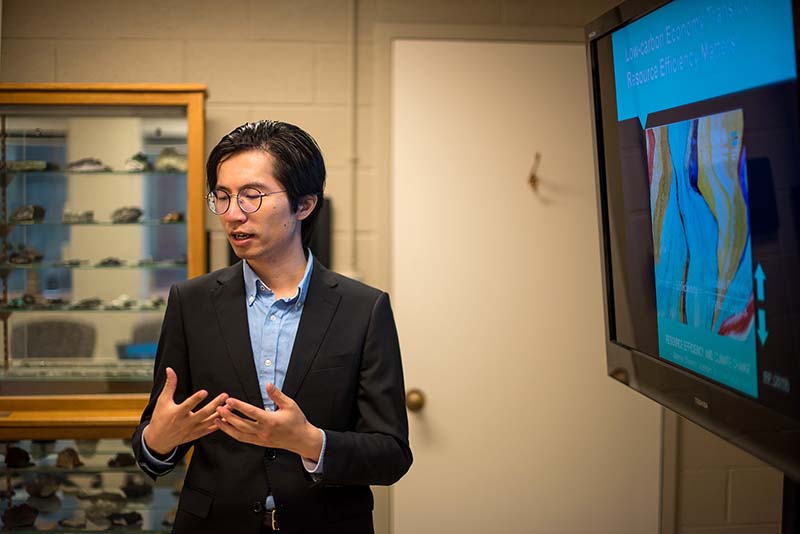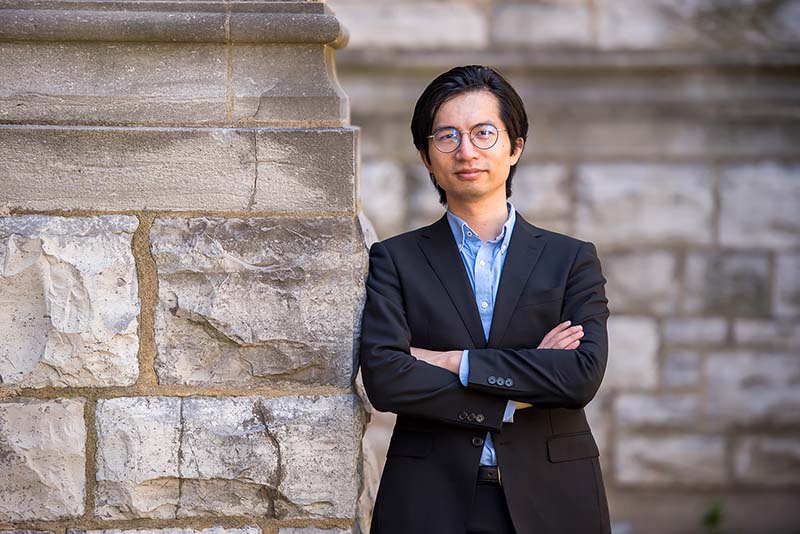Dr. Qian Zhang, an assistant professor in the Robert M. Buchan Department of Mining, is using data to map out a future of mineral resource management that is both more efficient, and more sustainable.
As an “industrial ecologist,” Zhang says he seeks to “quantify the energy and material flows that support our industrial systems, or human societies in general.” To achieve this, he employs an arsenal of analytical tools, including material flows analysis and life-cycle assessment. The work can be challenging, especially because societies and their material needs are constantly changing and evolving. “We need to understand the changing factors that can reshape the future of the mining industry,” he said.
As head of the Green Mining Value Chain lab (GreeMVC) at Queen’s, Dr. Zhang is taking a longitudinal approach to industrial forecasting. One of his recent areas of focus has been on Chinese steel production and coal consumption, which have steadily increased over the last 70 years due to sweeping industrialization. Zhang’s research indicates that the trend may shift dramatically in the coming decades. “China is committed to reducing its greenhouse gas emissions, that means they need to reduce their coal consumption, and also reduce these kinds of energy-intensive industries in their future economy,” said Zhang.
These far-flung predictions serve as a vital counterbalance to short-term corporate strategizing, especially in the mining industry where there’s typically a long lag time between project planning and execution. “It’s not nonsense to think several decades in the future. It really makes sense if we’re looking at the environmental impact or the climate change consequences of a mine,” he said.
According to Dr. Zhang, there are several significant issues that need to be addressed along the path to mining sustainability. “Air and water pollution, hazardous waste, environmental and social risks, and there is more and more pressure on the mining industry to collaborate on reaching climate change goals.” His work seeks to answer a fundamental question: how can we think about climate change mitigation, and at the same time bring new opportunities to the mining industry?
One of the most effective means of achieving those two goals is to reduce our waste output through investment in the so-called circular economy—where raw materials are continuously recycled rather than being discarded after their initial use. To incentivize the minimization of waste through reuse or repurposing, Zhang has suggested the adoption of a new economic metric to measure Resource Efficiency (RE). “RE is a way to monitor the progress within the circular economy, which will allow us to continue to maintain the economy and vitality, and at the same time reduce environmental pressure and reduce natural resource requirements,” he said.
To calculate RE in its most basic form, value added (GDP) is divided by the total material requirement, but Zhang says that both numerator and denominator can be tweaked in order to create a more representative metric. “We can bring in other measures of value, like happiness,” he said. Measures of material requirements can also be adjusted for a more complete picture of environmental impact. “Traditionally, we only think about resource use domestically, but this just shifts the environmental consequences to other countries,” said Zhang, adding, “it’s not really an equitable way to measure resource efficiency.” This study echoes ongoing discussions about specific indicators of Sustainable Development Goal 12 to ensure sustainable consumption and production patterns.
Zhang says the new metric may be a bit contentious among industry members. “The total supply chain issue, it requires all global stakeholders to work together, so this kind of compliance is harder to maintain,” he said. Despite the difficulty, Dr. Zhang says that there are companies who have been successful in enforcing environmental compliance throughout their global supply chains, something he hopes to see more of in the field of mining. “We need to work together with our stakeholders, and upstream and downstream suppliers, to make sure we come up with better indicators of sustainability,” he said.

Industrial buy-in is important for Zhang; he doesn’t want to see his work published in journals to be read only by his peers. Instead, he hopes to see his research catalyze tangible change. To that end, he aims to disseminate his work to the general public, and make sure it’s read by the younger generation of engineers. He also hopes to engage directly with mining companies, who Zhang says have become more receptive due to new technological opportunities they have to cope with mounting external and internal pressure to reform the industry. “More and more people, even investors, are calling for ESG compliance within the industry. There’s this new consensus that mining companies can do more for sustainability agendas,” he said.
“Dr. Zhang brings a rich and complete vision of the mining industry’s challenges, in regards to climate change and sustainability,” said Dr. Julián Ortiz, Department Head for the Robert M. Buchan Department of Mining. “By looking at the resource efficiency under the lens of the circular economy, his research can drive change towards a more sustainable management of mineral resources.”
Dr. Zhang comes to Queen’s with a varied academic and professional background, including undergraduate and master’s degrees in environmental science from Peking University in China. It was there that he first began to appreciate the value of employing an interdisciplinary approach to problem solving. “We were taught that environmental problems cannot be solved using just one discipline’s knowledge or approach, you need to recognize different driving factors and try to use different approaches to work on the issues,” he said.
While working toward his master’s degree he was given the opportunity to intern at the World Resources Institute in Beijing, where he experienced firsthand the potential for science to instigate real-world change. “The people there talked about moving towards a more sustainable society, and doing that through informative facts and policy suggestions, and engaging with people outside of the academic world,” said Zhang.
Upon earning his master’s degree studying air pollution in Beijing, he decided to redirect his efforts towards stemming the global threat of climate change. His ambitions led him to obtain a PhD in Urban Engineering from the University of Tokyo, before completing a postdoctoral fellowship at the University of Victoria, and eventually moving into his current position at Queen’s.
Dr. Zhang says he’ll have two researchers joining him in Fall 2021, a master’s level graduate student and a postdoc, who will contribute to efforts to bring data science into sustainability studies, focusing on the effectiveness of different practices like automation or resource recovery on reducing the mining industry’s carbon footprint. The effort is part of a broader goal to create a roadmap towards a greener, more sustainable future of mining. “We try to investigate new opportunities for the mining industry to enhance their automation or increase environmental governance, and gain economic benefits at the same time,” he said.
“This kind of approach leads to win, win, win solutions.”
